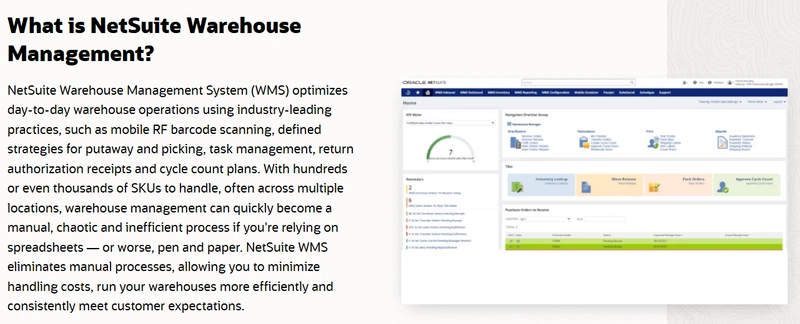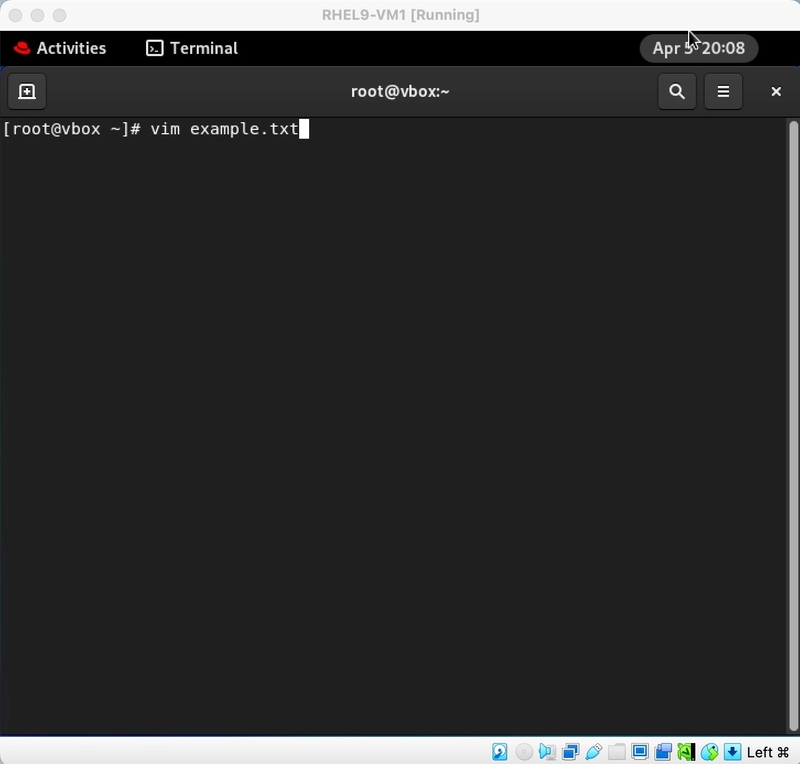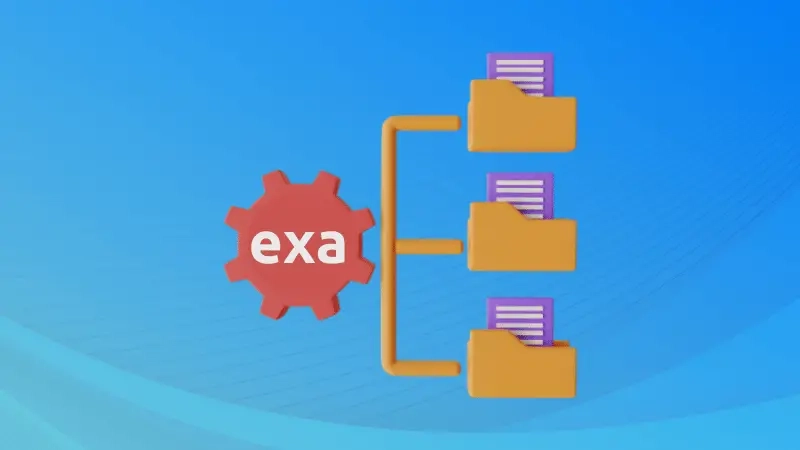Best Warehouse Inventory Management Software
Warehouse inventory management is critical for businesses looking to maintain accurate stock levels, streamline operations, and enhance order fulfillment. The right warehouse inventory management software (WIMS) can optimize tracking, reduce errors, and improve efficiency. This blog explores some of the best warehouse inventory management software solutions available today. 1. NetSuite WMS Overview: NetSuite Warehouse Management System (WMS) is a cloud-based solution designed to streamline warehouse operations by automating key processes like inventory tracking, order fulfillment, and real-time reporting. It integrates seamlessly with NetSuite’s ERP, making it ideal for businesses looking for a comprehensive solution. Key Features: Bin & Shelf Management: Organizes inventory efficiently using bin locations. Real-Time Inventory Tracking: Ensures accurate stock levels and reduces discrepancies. Barcode Scanning: Improves picking and packing accuracy. Multi-Location Support: Manages inventory across multiple warehouses. Automated Cycle Counting: Reduces manual counting efforts. Mobile Access: Supports warehouse operations via mobile devices. Pros: ✔️ Cloud-based and highly scalable. ✔️ Seamless integration with NetSuite ERP. ✔️ Strong automation and reporting tools. Cons: ❌ Expensive for small businesses. ❌ Can have a learning curve for new users. Best For: Medium to large enterprises Businesses already using NetSuite ERP Companies requiring multi-location warehouse management 2. Fishbowl Inventory Overview: Fishbowl Inventory is a powerful warehouse management software tailored for small to mid-sized businesses. It offers robust inventory tracking, order management, and integration with QuickBooks, making it a great choice for businesses needing an affordable yet feature-rich solution. Key Features: Inventory Tracking: Real-time tracking of stock levels, including raw materials and finished goods. Barcode Scanning: Speeds up warehouse operations and reduces errors. Multi-Location Management: Allows tracking inventory across multiple warehouses. Automated Reordering: Helps prevent stockouts by setting up automatic reorder points. Manufacturing Support: Includes Bill of Materials (BOM) and work order management. QuickBooks Integration: Syncs seamlessly with QuickBooks for accounting. Pros: ✔️ Affordable compared to enterprise-level WMS. ✔️ Strong integration with QuickBooks. ✔️ Comprehensive inventory tracking features. Cons: ❌ Limited advanced reporting compared to competitors. ❌ Requires an upfront cost for licensing. Best For: Small to mid-sized businesses Companies already using QuickBooks Businesses with manufacturing or assembly processes 3. SAP Extended Warehouse Management (EWM) Overview: SAP EWM is a high-end warehouse management solution designed for large enterprises with complex supply chain needs. It offers deep integration with SAP ERP and S/4HANA, making it ideal for businesses requiring advanced automation, analytics, and scalability. Key Features: Advanced Warehouse Automation: Supports robotics, conveyors, and automated storage systems. Task & Labor Management: Optimizes workforce productivity and assigns tasks efficiently. Inventory Optimization: Uses AI-driven forecasting to prevent overstocking or stockouts. Cross-Docking & Yard Management: Enhances supply chain efficiency by managing goods flow within and outside the warehouse. Batch & Serial Number Tracking: Ensures accurate product traceability. Multi-Warehouse & Global Support: Ideal for businesses with multiple distribution centers worldwide. Pros: ✔️ Highly scalable for large enterprises. ✔️ Seamless integration with SAP ERP & S/4HANA. ✔️ Strong automation and AI-driven insights. Cons: ❌ Expensive and requires a high implementation effort. ❌ Steep learning curve for new users. Best For: Large enterprises with complex supply chains Businesses already using SAP ERP/S/4HANA Companies needing advanced automation and analytics 4. Zoho Inventory Overview: Zoho Inventory is a cloud-based warehouse and inventory management solution designed for small to mid-sized businesses. It offers seamless integration with eCommerce platforms and accounting software, making it ideal for businesses selling online. Key Features: Multi-Channel Selling: Integrates with Amazon, eBay, Shopify, and Etsy for streamlined order management. Stock Tracking: Provides real-time inventory updates across multiple locations. Barcode Scanning: Speeds up warehouse operations and improves accuracy. Automated Reordering: Sends alerts when stock levels are low. Order Fulfillment & Shipping Integration: Works with major carriers like UPS, FedEx, and DHL. Reporting & Analytics: Generates detailed reports on sales, purchases, and inventory performance. Pros: ✔️ Affordable and easy to use. ✔️ Strong integration with eCommerce and accounting tools like Zoho Books and QuickBooks. ✔️ Cloud-based wi

Warehouse inventory management is critical for businesses looking to maintain accurate stock levels, streamline operations, and enhance order fulfillment. The right warehouse inventory management software (WIMS) can optimize tracking, reduce errors, and improve efficiency. This blog explores some of the best warehouse inventory management software solutions available today.
1. NetSuite WMS

Overview:
NetSuite Warehouse Management System (WMS) is a cloud-based solution designed to streamline warehouse operations by automating key processes like inventory tracking, order fulfillment, and real-time reporting. It integrates seamlessly with NetSuite’s ERP, making it ideal for businesses looking for a comprehensive solution.
Key Features:
- Bin & Shelf Management: Organizes inventory efficiently using bin locations.
- Real-Time Inventory Tracking: Ensures accurate stock levels and reduces discrepancies.
- Barcode Scanning: Improves picking and packing accuracy.
- Multi-Location Support: Manages inventory across multiple warehouses.
- Automated Cycle Counting: Reduces manual counting efforts.
- Mobile Access: Supports warehouse operations via mobile devices. Pros: ✔️ Cloud-based and highly scalable. ✔️ Seamless integration with NetSuite ERP. ✔️ Strong automation and reporting tools. Cons: ❌ Expensive for small businesses. ❌ Can have a learning curve for new users. Best For:
- Medium to large enterprises
- Businesses already using NetSuite ERP
- Companies requiring multi-location warehouse management
2. Fishbowl Inventory
Overview:
Fishbowl Inventory is a powerful warehouse management software tailored for small to mid-sized businesses. It offers robust inventory tracking, order management, and integration with QuickBooks, making it a great choice for businesses needing an affordable yet feature-rich solution.
Key Features:
- Inventory Tracking: Real-time tracking of stock levels, including raw materials and finished goods.
- Barcode Scanning: Speeds up warehouse operations and reduces errors.
- Multi-Location Management: Allows tracking inventory across multiple warehouses.
- Automated Reordering: Helps prevent stockouts by setting up automatic reorder points.
- Manufacturing Support: Includes Bill of Materials (BOM) and work order management.
- QuickBooks Integration: Syncs seamlessly with QuickBooks for accounting. Pros: ✔️ Affordable compared to enterprise-level WMS. ✔️ Strong integration with QuickBooks. ✔️ Comprehensive inventory tracking features. Cons: ❌ Limited advanced reporting compared to competitors. ❌ Requires an upfront cost for licensing. Best For:
- Small to mid-sized businesses
- Companies already using QuickBooks
- Businesses with manufacturing or assembly processes
3. SAP Extended Warehouse Management (EWM)
Overview:
SAP EWM is a high-end warehouse management solution designed for large enterprises with complex supply chain needs. It offers deep integration with SAP ERP and S/4HANA, making it ideal for businesses requiring advanced automation, analytics, and scalability.
Key Features:
- Advanced Warehouse Automation: Supports robotics, conveyors, and automated storage systems.
- Task & Labor Management: Optimizes workforce productivity and assigns tasks efficiently.
- Inventory Optimization: Uses AI-driven forecasting to prevent overstocking or stockouts.
- Cross-Docking & Yard Management: Enhances supply chain efficiency by managing goods flow within and outside the warehouse.
- Batch & Serial Number Tracking: Ensures accurate product traceability.
- Multi-Warehouse & Global Support: Ideal for businesses with multiple distribution centers worldwide. Pros: ✔️ Highly scalable for large enterprises. ✔️ Seamless integration with SAP ERP & S/4HANA. ✔️ Strong automation and AI-driven insights. Cons: ❌ Expensive and requires a high implementation effort. ❌ Steep learning curve for new users. Best For:
- Large enterprises with complex supply chains
- Businesses already using SAP ERP/S/4HANA
- Companies needing advanced automation and analytics
4. Zoho Inventory
Overview:
Zoho Inventory is a cloud-based warehouse and inventory management solution designed for small to mid-sized businesses. It offers seamless integration with eCommerce platforms and accounting software, making it ideal for businesses selling online.
Key Features:
- Multi-Channel Selling: Integrates with Amazon, eBay, Shopify, and Etsy for streamlined order management.
- Stock Tracking: Provides real-time inventory updates across multiple locations.
- Barcode Scanning: Speeds up warehouse operations and improves accuracy.
- Automated Reordering: Sends alerts when stock levels are low.
- Order Fulfillment & Shipping Integration: Works with major carriers like UPS, FedEx, and DHL.
- Reporting & Analytics: Generates detailed reports on sales, purchases, and inventory performance. Pros: ✔️ Affordable and easy to use. ✔️ Strong integration with eCommerce and accounting tools like Zoho Books and QuickBooks. ✔️ Cloud-based with mobile access. Cons: ❌ Limited features for large-scale warehouses. ❌ Some advanced automation features are only available in higher-tier plans. Best For:
- Small to mid-sized eCommerce businesses
- Startups looking for an affordable WMS
- Businesses needing QuickBooks or Zoho ecosystem integration
5. ShipBob WMS
Overview:
ShipBob WMS is a cloud-based warehouse management system designed primarily for eCommerce businesses. It provides end-to-end fulfillment solutions, making it an excellent choice for companies that want to optimize their order processing and shipping.
Key Features:
- Order Management: Automates order fulfillment and processing.
- Inventory Tracking: Provides real-time updates on stock levels.
- Multi-Warehouse Support: Allows businesses to distribute inventory across multiple fulfillment centers.
- Shipping Carrier Integration: Works with major carriers like USPS, UPS, FedEx, and DHL. -** Returns Management:** Simplifies the returns process for customers.
- Analytics & Reporting: Offers insights on inventory movement, order accuracy, and shipping performance. Pros: ✔️ Ideal for eCommerce brands needing fulfillment solutions. ✔️ Scalable with multi-location inventory management. ✔️ Simplifies shipping and logistics. Cons: ❌ Not ideal for traditional warehouse management (e.g., manufacturing). ❌ Higher costs compared to standalone WMS solutions. Best For:
- eCommerce businesses needing a fulfillment partner
- Companies selling on Shopify, Amazon, or WooCommerce
- Businesses looking to outsource logistics and shipping
6. Cin7
Overview:
Cin7 is an all-in-one inventory and warehouse management system designed for growing businesses. It provides advanced automation, multi-channel sales integration, and strong reporting tools, making it ideal for retailers, wholesalers, and distributors.
Key Features:
- Multi-Channel Inventory Management: Syncs inventory across online stores, marketplaces, and retail locations.
- Warehouse Automation: Streamlines order processing, stock transfers, and fulfillment workflows.
- Barcode Scanning: Enhances picking and packing accuracy.
- B2B & eCommerce Integration: Connects with Shopify, WooCommerce, Amazon, eBay, and more.
- Built-In EDI (Electronic Data Interchange): Simplifies transactions with large retailers.
- Real-Time Reporting & Analytics: Tracks inventory levels, sales, and profitability. Pros: ✔️ Strong automation and integration capabilities. ✔️ Supports both retail and wholesale businesses. ✔️ Scalable for growing companies. Cons: ❌ Can be complex for beginners. ❌ Higher pricing compared to basic inventory tools. Best For:
- Retailers, wholesalers, and distributors
- Businesses selling across multiple online and offline channels
- Companies looking for automation and strong reporting tools
7. Manhattan WMS
Overview:
Manhattan WMS is a powerful warehouse management system designed for large enterprises with complex logistics and supply chain needs. It leverages AI and machine learning to optimize warehouse operations, making it a top choice for high-volume warehouses and distribution centers.
Key Features:
- AI-Driven Optimization: Uses machine learning for inventory placement and demand forecasting.
- Task & Labor Management: Assigns tasks dynamically to improve efficiency.
- Robotic & Automation Integration: Supports warehouse robotics, conveyors, and automated picking systems.
- Multi-Warehouse & 3PL Support: Enables seamless management of multiple distribution centers.
- Omnichannel Fulfillment: Integrates with retail, eCommerce, and wholesale channels.
- Advanced Reporting & Analytics: Provides deep insights into warehouse performance. Pros: ✔️ Highly scalable for enterprise-level operations. ✔️ AI-driven insights enhance efficiency. ✔️ Supports automation and robotics. Cons: ❌ Expensive and requires a long implementation process. ❌ May be too complex for small to mid-sized businesses. Best For:
- Large enterprises with high-volume warehouses
- Businesses needing AI-driven optimization and automation
- Companies managing multi-location distribution centers
8. Ordoro
Overview:
Ordoro is a warehouse and inventory management system specifically designed for eCommerce businesses. It offers strong shipping, fulfillment, and inventory automation features, making it a great choice for online retailers.
Key Features:
- Multi-Channel Inventory Management: Syncs inventory across Shopify, Amazon, eBay, WooCommerce, and other platforms.
- Shipping Carrier Integration: Works with USPS, FedEx, UPS, and DHL for cost-effective shipping.
- Barcode Scanning & Pick Lists: Streamlines warehouse operations for efficient order fulfillment.
- Automated Dropshipping: Routes orders directly to suppliers for fulfillment.
- Kitting & Bundling: Allows businesses to sell products in bundles without inventory errors.
- Returns Management: Simplifies processing returns and exchanges. Pros: ✔️ Excellent shipping and fulfillment tools. ✔️ Easy integration with eCommerce platforms. ✔️ Affordable compared to enterprise-level WMS solutions. Cons: ❌ Not ideal for large-scale warehouse operations. ❌ Limited advanced reporting compared to competitors. Best For:
- eCommerce businesses selling on multiple platforms
- Companies needing streamlined order fulfillment and shipping
- Businesses using dropshipping or bundled products
9. Infoplus
Overview:
Infoplus is a cloud-based warehouse management system designed for mid-sized and large businesses that require detailed control over inventory, fulfillment, and supply chain operations. It is particularly well-suited for third-party logistics (3PL) providers, wholesalers, and eCommerce companies.
Key Features:
- Advanced Inventory Management: Tracks inventory across multiple warehouses with real-time updates.
- Order Fulfillment & Automation: Optimizes picking, packing, and shipping workflows.
- Barcode Scanning & Label Printing: Enhances accuracy in warehouse operations.
- 3PL Billing & Management: Supports businesses handling fulfillment for multiple clients.
- Business Intelligence & Reporting: Provides deep insights into inventory trends and warehouse efficiency.
- API & Integration Support: Connects with eCommerce platforms, accounting tools, and shipping carriers. Pros: ✔️ Strong automation and workflow optimization. ✔️ Scalable for mid-sized to large businesses. ✔️ Detailed reporting and analytics. Cons: ❌ Steeper learning curve compared to simpler WMS solutions. ❌ Can be expensive for small businesses. Best For:
- Third-party logistics (3PL) providers
- Mid-sized to large eCommerce and wholesale businesses
- Companies needing robust automation and reporting tools
10. Oracle
Overview:
Oracle WMS Cloud is an enterprise-grade, cloud-based warehouse management system designed for large-scale businesses and global supply chains. It provides advanced automation, AI-driven optimization, and real-time inventory visibility, making it a top choice for enterprises with complex logistics needs.
Key Features:
- AI-Driven Warehouse Optimization: Uses machine learning to improve inventory placement and order fulfillment.
- Robotic & Automation Integration: Supports warehouse robots, conveyor systems, and automated picking solutions.
- Multi-Warehouse & Global Support: Manages inventory across multiple locations worldwide.
- Real-Time Inventory Visibility: Offers live tracking and analytics for accurate decision-making.
- Task & Labor Management: Optimizes workforce productivity and reduces operational costs.
- Omnichannel Fulfillment: Supports B2B, B2C, and 3PL operations seamlessly.
- Cloud-Based Scalability: Provides flexible deployment with secure cloud storage. Pros: ✔️ Highly scalable for global enterprises. ✔️ AI-powered insights and automation. ✔️ Strong integration with Oracle ERP and other enterprise systems. Cons: ❌ Expensive and requires expert implementation. ❌ Complex system with a steep learning curve. Best For:
- Large enterprises with global supply chains
- Businesses needing AI-driven automation and optimization
- Companies already using Oracle ERP or cloud solutions
11. Blue Yonder
Overview:
Blue Yonder (formerly JDA Software) offers a powerful AI-driven warehouse management system designed for large enterprises and third-party logistics (3PL) providers. It focuses on automation, predictive analytics, and supply chain optimization to improve warehouse efficiency and customer satisfaction.
Key Features:
- AI & Machine Learning Optimization: Uses predictive analytics to enhance inventory placement and demand forecasting.
- Robotics & Automation Support: Integrates with warehouse robotics, automated picking systems, and conveyors.
- Labor & Task Management: Assigns tasks dynamically to improve workforce efficiency.
- Real-Time Inventory Visibility: Tracks stock levels and movement across multiple locations.
- Omnichannel Fulfillment: Supports B2B, B2C, and eCommerce operations.
- Cloud-Based & Scalable: Offers flexible deployment with real-time data access. Pros: ✔️ AI-driven automation for warehouse optimization. ✔️ Strong integration with supply chain and ERP systems. ✔️ Scalable for large enterprises and 3PL providers. Cons: ❌ Expensive and requires a long implementation process. ❌ Complex interface that requires training. Best For:
- Large enterprises with complex warehouse needs
- Businesses looking for AI-powered automation
- 3PL providers managing multiple clients












































































































































































![[The AI Show Episode 142]: ChatGPT’s New Image Generator, Studio Ghibli Craze and Backlash, Gemini 2.5, OpenAI Academy, 4o Updates, Vibe Marketing & xAI Acquires X](https://www.marketingaiinstitute.com/hubfs/ep%20142%20cover.png)



























































































































![[DEALS] The Premium Learn to Code Certification Bundle (97% off) & Other Deals Up To 98% Off – Offers End Soon!](https://www.javacodegeeks.com/wp-content/uploads/2012/12/jcg-logo.jpg)


![From drop-out to software architect with Jason Lengstorf [Podcast #167]](https://cdn.hashnode.com/res/hashnode/image/upload/v1743796461357/f3d19cd7-e6f5-4d7c-8bfc-eb974bc8da68.png?#)








































































































.png?#)

































_Christophe_Coat_Alamy.jpg?#)
 (1).webp?#)





































































































![Apple Considers Delaying Smart Home Hub Until 2026 [Gurman]](https://www.iclarified.com/images/news/96946/96946/96946-640.jpg)
![iPhone 17 Pro Won't Feature Two-Toned Back [Gurman]](https://www.iclarified.com/images/news/96944/96944/96944-640.jpg)
![Tariffs Threaten Apple's $999 iPhone Price Point in the U.S. [Gurman]](https://www.iclarified.com/images/news/96943/96943/96943-640.jpg)




































































































































